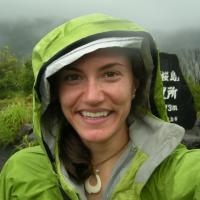
Research Focus:
Spatial coherence of precipitation extremes
Research Abstract:
Extreme precipitation events across the Northwest, although rare, impact the region by causing increased runoff, flooding, damages to infrastructure and loss of life and property. These impacts may be enhanced if an extreme event is synchronous across a basin or region as opposed to being a localized occurrence. Understanding the degree to which precipitation extremes are spatially synchronized provides additional insight into their potential impacts and the atmospheric processes that promote spatially coherent precipitation extremes. Using data from the National Weather Service Cooperative (COOP) and the Natural Resources Conservation Service Snow Telemetry (SNOTEL) stations, 3-day precipitation accumulations exceeding the 95th percentile are examined over the past two decades. Simple metrics are used to show the relationship between distance and the probability of synchronous occurrence of extremes between station pairs, the regional representativeness of each station, and the preferential direction for coherence. Additionally, the relationship between Pineapple Express events and coherent extremes is examined. Initial results show that the spatial coherence of extremes between stations decays with distance, and that there are spatial patterns to both measures of regional representativeness and preferential direction of coherence. The role of Pineapple Express events in producing extreme precipitation exhibits clear spatial patterns across the region, and though many of the most coherent extreme events have coincided with these storms, Pineapple Express storms do result in regional extreme events of both high and low coherence.
Biography:
Lauren Parker began a PhD program in Geography at the UI in the fall of 2013 working with John Abatzoglou. Prior to her move to UI, Lauren was an Assistant Professor of Geoscience at Salt Lake Community College in Salt Lake City, Utah, where she taught courses on physical geography, GIS, and natural hazards. Lauren has varied research interests ranging from climatology to natural resources science and management. She is passionate about water issues in the West and is working to marry her background and research interests in the development of her dissertation proposal. She holds an MS in Geography from OSU, and a BA in Geography from Mount Holyoke College.
Publications and Presentations:
Parker, L.E., and J.T. Abatzoglou. 2017. Comparing mechanistic and empirical approaches to modeling the thermal niche of almond International Journal of Biometeorology, doi: 10.1007/s00484-017-1338-9.
Parker, L.E., and Abatzoglou, J.T. 2016. Projected changes in cold hardiness zones and suitable overwinter ranges of perennial crops over the United States. IOP Publishing Ltd.
Available online: http://iopscience.iop.org/article/10.1088/1748-9326/11/3/034001/metal
Parker, L.E., and Abatzoglou, J. 2016. Projected changes in cold hardiness zones and suitable overwinter ranges of perennial crops over the United States. Environmental Research Letters. 11(3).
Hicke, J., Abatzoglou, J., Daley-Laursen, S., Esler, J., Parker L. 2016. Using scientific conferences to engage the public on climate change. Bulletin of the American Meteorological Society. DOI:10.1175/BAMS-D-15-00304.1, in press.
Parker, L., Abatzoglou, J. 2016. Spatial coherence of extreme precipitation events in the Northwestern United State. International Journal of Climatology. 36(6): 2451-2460.
Edwards, L., Bunkers, M., Abatzogou, J., Todey, D., Parker, L. 2014. October 2013 blizzard in Western South Dakota. American Meteorological Society. 95(9): 23-26.

